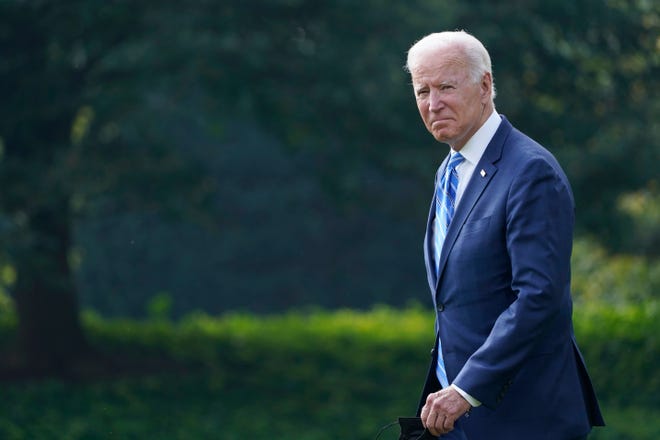
WASHINGTON – Negotiations continued Tuesday in Congress over lowering the price tag on a budget bill packed with progressive policies as the threat of the first U.S. default on its debt hangs over Capitol Hill.
After a whirlwind week that concluded Friday without a deal on Biden's budget bill that would satisfy both progressives and moderate Democrats, the various factions were back at the table this week to hammer out details on a revised plan.
Democratic leaders said last week that President Joe Biden's $3.5 trillion budget plan with liberal priorities like subsidized childcare and community college, would need to be scaled back to meet moderates who say the price tag is too high.
Biden met with progressive Democrats on Monday and planned to meet with moderates on Tuesday.
Democratic divisions on the budget bill are holding up a $1.2 trillion bipartisan infrastructure bill. House progressives say they'll vote down the measure if the larger package isn't hashed out first.
At the same time, Congress faces the threat of a debt ceiling crisis. Republicans have refused to vote with Democrats to raise the limit on the amount of money the government can borrow to pay its bills. Democrats have proven reluctant to use a maneuver called reconciliation, which would require a majority vote in the Democrat-led Senate, to raise the debt limit without Republican votes.
More:The US has never defaulted before. In the debt ceiling crisis, what happens if it does?
If Congress doesn't raise the limit, the government could default on its debts, potentially setting off a cascade of economic turmoil.
Biden would sign bill that includes abortion funding ban
President Joe Biden told reporters Tuesday he would sign a massive bill funding much of his legislative agenda even if it includes language he opposes to block most federal funding for abortion.
“I’d sign it either way,” Biden said.
West Virginia Sen. Joe Manchin, one of a vanishing group of anti-abortion Democrats, has said that without the funding prohibition for abortion, he won’t vote for a multi-trillion-dollar spending package.
“That’s dead on arrival if that’s gone,” Manchin has said of the ban known as the Hyde Amendment.
Last year, Biden reversed his decades-long support for the ban, which blocks Medicaid and other federal programs from paying for abortions unless in cases of rape or incest.
Biden, who has said he personally opposes abortion, frames his views in the context of one of his top priorities: creating a more equitable society for people of color and other marginalized groups.
White House spokeswomen, on Monday and Tuesday, had repeated Biden’s opposition to the Hyde amendment when asked about Manchin’s “red line.”
“His position on that has not changed in the last 24 hours,” deputy press secretary Karine Jean-Pierre told reporters mid-day on Tuesday.
Biden’s comments came in the evening, as he returned to the White House after a trip to Michigan to build support for the programs in the pending legislation.
-- Maureen Groppe
Changes to the filibuster and the debt ceiling?
Democrats could change the filibuster to get around GOP obstruction to raising the debt limit, President Joe Biden said Tuesday.
“Oh, I think that’s a real possibility,” Biden told reporters as he returned to the White House after pushing his legislative agenda during a trip to Michigan.
Altering the filibuster would require all Senate Democrats to support the effort. But at least two Democrats – Sens. Joe Manchin of West Virginia and Kyrsten Sinema of Arizona – have opposed ending it.
Manchin declined to talk about the filibuster with reporters Tuesday.
“I’m not going to say anything about it,” Manchin said.
Republicans are blocking Democratic efforts to bring to the floor legislation that would allow the government to pay its bills after mid-October.
Unless they change the filibuster, Democrats need 60 votes to get around the GOP obstruction. They have 50.
Progressives have been pushing for the filibuster to be eliminated entirely, which Biden has opposed. But the president's comments Tuesday suggest he could support an exception for debt ceiling legislation.
Democrats’ other option to avoid the government defaulting on its debts is to use a procedural method that doesn’t require 60 votes, which is what Senate Minority Leader Mitch McConnell, R-Ky., has told them to do. But Biden and Senate Majority Leader Chuck Schumer, D-N.Y., argue that process is too cumbersome and would take weeks.
-- Maureen Groppe
Biden: Manchin ‘seems like he’s moving’ closer on deal
President Joe Biden expressed optimism Sen. Joe Manchin could go beyond the $1.5 trillion limit the West Virginia Democrat laid out as his ceiling for the price tag of the Build Back Better Act.
“It sure seems like he’s moving. I hope that’s the case,” Biden said Tuesday.
Manchin is one of two Democratic senators (along with Kyrsten Sinema of Arizona) who have balked at the $3.5 trillion bill, saying its scope and size were too large. In response, Biden has been suggesting a price tag closer to $2 trillion, which would still surpass Manchin’s stated limit.
Biden asked House Progressives to lower their spending bill by more than $1 trillion during a virtual call Monday afternoon on his Build Back Better Act.
Progressives have not offered a final counteroffer, but want the bill to include all of the programs and priorities, and have the top-line encompass those.
Rep. Pramila Jayapal, D-Wash., chair of the Congressional Progressive Caucus, conceded last week the $3.5 trillion number would probably come down to meet demands of moderates in the Senate, who are currently holding up the reconciliation package, which in turn is delaying a vote on a separate bipartisan infrastructure bill.
-- Savannah Behrmann
No call yet between Biden and McConnell
A day after Senate Minority Leader Mitch McConnell warned President Joe Biden to pursue a different course on raising the debt limit, the two have not spoken.
On Monday morning, Biden told reporters he had just read McConnell’s letter and “I plan on talking to Mitch about it.”
“I hope we can have some intelligent and honest conversation about what he’s proposing,” Biden said.
In the letter, McConnell said Democrats were "sleepwalking" to economic catastrophe and urged them to raise the debt ceiling with Republicans.
Tuesday afternoon, White House deputy press secretary Karine Jean-Pierre said that while Biden “is always open to having conversation,” there has been no call.
There has, however, been contact with McConnell from “the highest levels of the administration,” including a recent phone conversation with Treasury Secretary Janet Yellen, she said.
“And in those conversations, we've made clear how catastrophic the consequences would be if Republicans continue to vote to default, and block Democrats from solving this ourselves,” she said.
– Maureen Groppe
Moderate leader lashes out at ‘faction of the far left’
Rep. Josh Gottheimer, the New Jersey centrist who co-chairs the Problem Solvers Caucus, urged fellow Democrats Tuesday not to imperil a hard-fought infrastructure bill amid a continuing schism in the caucus over a larger social safety net spending bill.
“We must not let a faction of the far left kill an historic infrastructure bill that will help create 2 million labor jobs a year, build the Gateway Tunnel (connecting New Jersey with New York City), fix our crumbling roads and bridges, upgrade our broadband, get lead out of our children’s drinking water, and repair NJ Transit,” he said in a prepared statement. “This historic bill passed the Senate in early August. We need to get shovels in the ground and Americans to work as soon as possible.”
Gottheimer’s comments underscored the growing tension between moderates within the Democratic caucus and progressives, led by Rep. Pramila Jayapal, D-Wash.
Moderates were frustrated last week when House Speaker Nancy Pelosi pulled the five-year, $1.2 trillion infrastructure bill from consideration because progressives threatened to torpedo the measure by withholding their support until the larger 10-year, $3.5 trillion Build Back Better bill had been agreed to.
The negotiations on the larger bill continue with President Joe Biden telling progressives they needed to get close to around $2 trillion.
– Ledyard King
Schumer: Nation lurching ‘dangerously close’ to default
Senate Majority Leader Chuck Schumer once again warned of the financial calamity that would ensue if the nation’s debt ceiling is not raised or suspended by Oct. 18, the date at which the Biden administration says the government would reach its limit and begin defaulting on its debts.
The Senate is scheduled to vote on a procedural rule Wednesday that would allow a measure suspending the debt limit until December 2022 to reach the floor for a vote. But if anyone objects to that rule, it would require 60 votes to overcome the filibuster – a tall order considering there are only Democrats in the Senate and no Republicans have indicated they would join them.
“It’s not too late but it’s getting dangerously close,” Schumer, D-N.Y., said on the Senate floor Tuesday, imploring passage of the bill by the end of the week. “We can resolve the debt ceiling this week and reassure the world that the full faith and credit of the United State will never be in question. Democrats are going to do the responsible thing and vote yet to prevent a default.”
The national debt, now approaching $29 trillion, keeps rising due to past tax and spending decisions made by both parties. Republican leaders have said they won’t participate in helping Democrats raise the ceiling this time because Democrats hold both chamber of Congress and the White House and because they say Democrats have not included them enough in spending decisions since Biden took office in January.
If the U.S. defaults on its debt for the first time, the results could lead to a global recession, Treasury officials and experts say. A tanked market would hurt 401(k)s and other investments. For example, a debt ceiling standoff in 2013 cost the economy 1% in GDP.
– Ledyard King and Mabinty Quarshie
Yellen: Debt default would be ‘catastrophic’ and may lead to recession
Treasury Secretary Janet Yellen told CNBC Tuesday morning that failing to raise or suspend the debt ceiling by Oct. 18 would be "catastrophic."
"I fully expect it would cause a recession as well," she added.
The U.S. is 13 days away from the Oct. 18 deadline, when the department expects it will run out of “extraordinary measures” to keep the country from defaulting.
The delay is caused by partisan disagreements on Capitol Hill, where Democrats are insisting Republicans vote with them to raise the limit. But Republicans say they won't help and want Democrats to use a process called reconciliation, which would allow Democrats to raise the debt ceiling without Republican support.
– Savannah Behrmann and Mabinty Quarshie
Biden, Democrats moving closer on Build Back Better price tag
Congressional Democrats and President Joe Biden are working towards a deal on their spending bill in an effort to bring every congressional Democrat on board, with the White House offering between $1.9 trillion and $2.2 trillion in an effort to win over moderates balking at its size and scope, according to two sources familiar with the negotiations.
Biden asked House Progressives to lower their spending bill by more than $1 trillion during a virtual call Monday afternoon on his 10-year, $3.5 trillion Build Back Better Act, while progressives countered with $2.5 trillion, according to one of the sources.
Biden has been trying to unite a divided caucus behind a far-reaching proposal that would address social welfare priorities that are a priority for progressives, such as climate initiatives, and subsidized caregiving, childcare, pre-kindergarten and community college. But centrists, notably Democratic Sens. Joe Manchin of West Virginia and Kyrsten Sinema of Arizona, have resisted such a massive spending program.

Last week, Manchin revealed that he would be willing to go as far as $1.5 trillion but was adamant about not going along with most of what progressives want.
"I cannot – and will not – support trillions in spending or an all or nothing approach that ignores the brutal fiscal reality our nation faces," he said.
On Tuesday, a spokesperson for Manchin said he had no new comments in reaction to the president’s new funding target.
– Ledyard King and Savannah Behrmann

Source link








